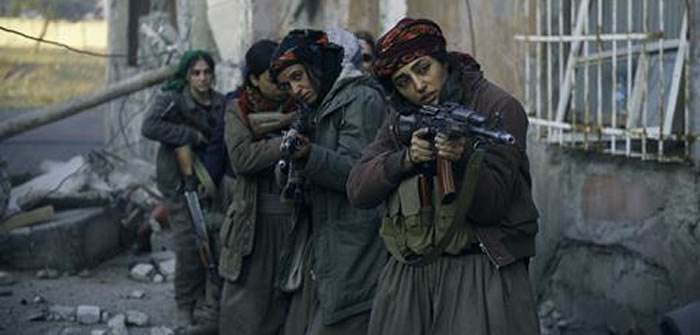At the end of Eva Husson’s “Girls of the Sun,” a female peshmerga fighter enjoins a French journalist: “Write the truth.” The problem, unrecognized by Husson, who also wrote this pedantically commonplace drama, is that there are multiple ways of telling the truth: One brings to life three-dimensional people who respond to based-on-fact situations in ways that reflect the messiness of being human. “Girls” could be used as a case study for the other type of truth telling, the kind that studies real events and then packages them for mass consumption in ways that, while mimicking the facts in their barest form, offer no insight nor any sense of believable character. However, as this is a femme-centric film, directed by a woman, about a group of women courageously fighting ISIS, it’s a shoo-in for international distribution.
Those expecting something along the lines of Husson’s debut feature “Bang Gang” will be surprised by its old-fashioned earnestness, and to be fair, it’s hard not to be intimidated by the burden of representing the extraordinary Kurdish female forces who’ve been such a crucial element in the fight against ISIS in Iraqi Kurdistan. For that reason, interested parties are better off checking out some of the documentaries, such as “Gulîstan, Land of Roses,” rather than this well-intentioned yet cliché-riddled lunge at the tear ducts.
Husson crams in as much exposition as possible in the opening scenes, using the hoary formula of a diary-like voiceover to get inside the head of traumatized French journalist Mathilde (Emmanuelle Bercot), sporting an eye patch thanks to wounds she received while reporting from Homs. She’s about to be embedded with a peshmerga unit in north-western Kurdistan (filming was done in Georgia), but courage has fled her soul and she questions her worthiness. Once off the transport plane, she’s introduced to Commander Zirek (Ahmet Zirek), arguing strategy with Bahar (Golshifteh Farahani), the impatient leader of the women’s unit. Bahar, a former lawyer, will of course get her way.
When Mathilde is informed that the unit is composed entirely of former ISIS captives, Bahar looks off to the side in pained contemplation, allowing the director to clumsily insert a flashback of her husband (Adik Bakoni) and son (Tornike Alievi) before ISIS invaded their home, followed by clouds moving across the sky — yes, it’s that kind of movie. More flashbacks ensure that no element of Bahar’s background is missed: One night she gets a call that ISIS is approaching her town, but it’s too late: The menfolk are murdered while the women and children are rounded up and then separated. Bahar’s sister Suzan (Nuka Asatiani) is raped (Bahar screams, “Take me!”), and then she herself is violated in what was a horrifically common real-life story.
Flash forward and Bahar has convinced Zirek to allow her to take the unit into a mined tunnel with a captured ISIS soldier in order to infiltrate the town and free children from the school where they’re being held. Following a classic pep talk to her fighters, we get another flashback to show how Bahar found the courage to become the Moses of her people, though Moses never delivered a baby — suffice it to say that not even Melanie Wilkes’ water broke at such an inopportune moment. Through it all, Mathilde is taking notes and photographs while struggling with her inner demons.
The script is the film’s biggest liability, stuffed with old chestnuts that would be more at home in a Hollywood adventure film from the 1950s. Mathilde and Bahar are assigned personalities according to types, reinforced by what others say about them (or in Mathilde’s case, her Script 101 monologues), while everyone else is blandly interchangeable. Husson even has the hubris to write the lyrics to her very own peshmerga song, translated into Kurdish and sung by the unit (why do that when the Kurdish music tradition is such an important part of the culture?). And isn’t it odd that the word “Yazidi” is never uttered, though its scattered throughout the press notes provided at Cannes? Clearly the director’s positive impressions from her research made her want to create something that would generate popular sympathy for the cause, but writing a glorified TV movie wasn’t the way to go.
Farahani and Bercot are fine actresses who can’t do anything with lines or situations so lacking in nuance. Even Mattias Troelstrup’s cinematography, one of the stronger points of “Bang Gang,” has a generic feel or worse, such as an incongruously elegant drone shot that circles round the unit as they try shooting at an ISIS escort, prettifying a deadly skirmish that’s further banalized by Morgan Kibby’s sweeping and sappy orchestrations. Sound design is one of the film’s most successful elements.
Written by Jay Weissberg for Varitey

